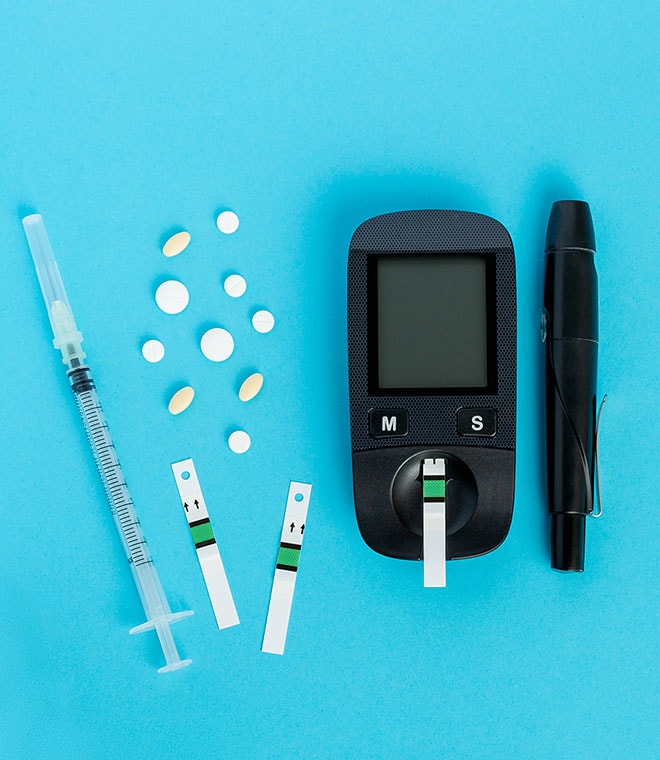Health
Managing diabetes medication side effects
By Jenilee Matz, MPH May 21, 2024 • 7 min
Diabetes medications are essential to help keep blood sugar in control. But as with any medication, these medications come with possible risks and side effects. Thankfully, many side effects from diabetes medications can be temporary, manageable or preventable.
Why do side effects happen?
All medications come with a risk of side effects, and some are more common than others. Since not all people respond to medication the same way, it's tricky to know if you'll experience side effects. It can depend on how your body absorbs the medication. Other factors, such as age, gender, allergies, additional medications and dietary supplements, can also affect your risk of side effects.
Side effects and diabetes medications
When you're prescribed a new medication for diabetes, ask your healthcare provider what side effects to watch for and which of these warrant medical attention. Do not stop taking any medication unless directed by your provider.
Insulin
All people with type 1 diabetes and some people with type 2 diabetes need to take insulin. It may be taken by an injection, either through a syringe, insulin pen or insulin pump that's connected to your body. Possible side effects include:
- A reaction at the site on your skin where you receive the injection. Rotation of the injection site helps reduce irritation and bruising, as well as improves absorption. It is important to give your mealtime insulin in the same general area every day, such as your leg before breakfast and your abdomen before dinner. Hard lumps or extra fatty deposits can form under the skin if you administer insulin too close to the same spot too often. Not only are these problems unsightly, but they can also make insulin less effective.
- Low blood sugar. Insulin brings high blood sugar levels down, but taking too much or not balancing insulin with your diet or physical activity can cause your blood sugar levels to drop too low. This can make you irritable, jittery and sweaty. Low blood sugar is dangerous and requires prompt treatment. If you have low blood sugar, follow your treatment plan as prescribed by your healthcare provider.
Oral diabetes drugs
Many people with type 2 diabetes need to take oral diabetes medications to help keep blood sugar levels under control. Possible side effects for the different medications are outlined below:
Drug class |
Drug name |
Possible side effects |
Sulfonylureas |
Glipizide (Glucotrol), Glipizide extended release (Glucotrol XL), Glyburide (Diabeta, Glynase, Micronase), Glimepiride (Amaryl) |
Low blood sugar, weight gain, skin rash
|
Meglitinides
|
Repaglinide (Prandin), Nateglinide (Starlix)
|
Low blood sugar, weight gain
|
Biguanides
|
Metformin (Glucophage), Metformin extended release (Glumetza, Glucophage XR, Fortamet)
|
Nausea, diarrhea, upset stomach, loss of appetite |
Thiazolidinediones
|
Pioglitazone (Actos), Rosiglitazone (Avandia)
|
Weight gain, swelling or fluid retention, increased risk of developing or worsening heart failure, heart attack, bone breaks
|
Alpha-glucosidase inhibitors
|
Acarbose (Precose), Miglitol (Glyset) |
Stomach pain, gas, diarrhea
|
Dipeptidyl Peptidase-4 (DPP-4) inhibitors
|
Sitagliptin (Januvia), Linagliptin (Tradjenta), Saxagliptin (Onglyza), Alogliptin (Nesina)
|
Diarrhea, upper respiratory tract infections, sore throat
|
Bile acid sequestrants
|
Colesevelam (Welchol)
|
Gas, nausea, constipation
|
Dopamine-2 agonists
|
Bromocriptine quick release (Cycloset)
|
Nausea, weakness, constipation, dizziness
|
Sodium-glucose cotransporter-2 (SGLT2) inhibitors
|
Canagliflozin (Invokana), Dapagliflozin (Farxiga), Empagliflozin (Jardiance), ertugliflozin (Steglatro)
|
Urinary tract and yeast infections |
Other injectable medicines
Some people with type 1 or type 2 diabetes need to take injectable drugs other than insulin to help control blood sugar. Possible side effects for the different medications are outlined below:
Drug class |
Drug name |
Possible side effects |
Amylin analog |
Pramlintide (Symlin)
|
Low blood sugar, nausea, vomiting, headache, stomach pain |
Glucagon-like peptide-1 (GLP-1) receptor agonists
|
Abiglutide( Tanzeum), Dulaglutide (Trulicity), Exenatide (Byetta), Exenatide extended release (Bydureon), Liraglutide (Victoza), Lixisenatide (Adlyxin), semaglutide (Ozempic, Rybelsus) |
Nausea, vomiting, headache, dizziness, increased risk of pancreatitis |
Coping with minor side effects
Talk to your healthcare provider if you have unexpected or bothersome symptoms. They can help you determine if your symptoms are side effects of your medicine or are caused by something else. Your provider or pharmacist can offer suggestions to manage the side effects. Your provider may also decide to lower your dose, switch you to another diabetes medication or suggest changes to your diet or lifestyle to help you feel better.
Taking medications exactly as directed may lessen or eliminate some side effects. For example, some medications need to be taken with food or else they may upset your stomach. If your medicine causes modest weight gain, following the other parts of your treatment plan, such as eating a healthy diet and exercising regularly, can help you maintain your weight. Using the correct dose of insulin can help reduce the risk of low blood sugar, and rotating the injection site can help lower the risk of skin reactions at the injection site.
A word on serious side effects
Though rare, dangerous side effects can occur from taking a medication. Keep in mind that your healthcare provider prescribes medicine when they feel the benefit of taking a drug outweighs the risk of not taking it. If you're taking a medication where a serious side effect is a risk, let your provider know if you have any unusual symptoms. If your symptoms are concerning, seek medical help right away.
Clinically reviewed and updated May 2024.
Sources:
- https://care.diabetesjournals.org/content/diacare/44/Supplement_1/S111.full.pdf
- https://www.ncbi.nlm.nih.gov/books/NBK279506/
- https://www.niddk.nih.gov/health-information/diabetes/overview/insulin-medicines-treatments
- https://www.diabetes.org/healthy-living/medication-treatments/insulin-other-injectables/insulin-routines#:~:text=Each%20mealtime%20injection%20of%20insulin,more%20similar%20blood%20sugar%20results
- https://www.mayoclinic.org/diseases-conditions/type-2-diabetes/in-depth/diabetes-treatment/art-20051004?pg=2
- https://www.uptodate.com/contents/hypoglycemia-low-blood-sugar-in-diabetes-mellitus-beyond-the-basics?source=related_link


